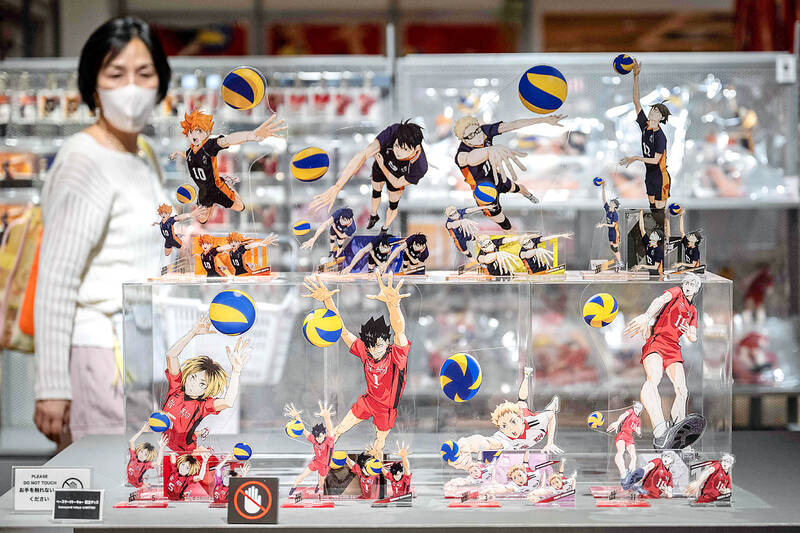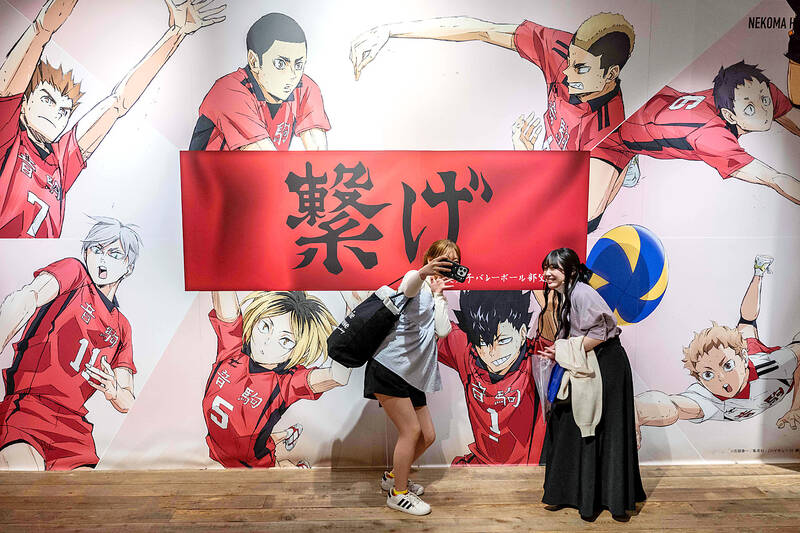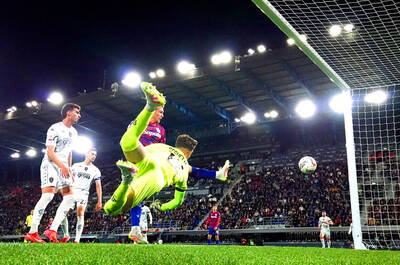Men’s volleyball is flying high in Japan with the national team ranked fourth globally ahead of the Paris Olympics with the sport’s soaring popularity fueled by a manga blockbuster.
Haikyu!!, the tale of school teams featuring an inspirational comic-book hero determined to beat the odds and his diminutive stature, has sold 60 million copies since its 2012 inception.
Turned into a hit anime series, now a film Haikyu!!: The Dumpster Battle has taken ¥10 billion (US$64.2 million) at the Japanese box office and is to be released in North America this month.

Photo: AFP
Masahiro Yanagida, who captained the national team from 2018 to 2021, said he was “immensely grateful” that the exploits of the fictional team have helped trigger a boom in numbers hitting the courts.
“I have all volumes of the manga myself,” he said, recalling being “completely hooked” on its “pretty realistic” depictions of the sport.
High-school volleyball club membership for boys soared from 35,000 in 2012 to more than 50,000 this year, official records showed.

Photo: AFP
Among those inspired is Kaede Sakashita, 10, seeking to emulate Haikyu!! elite setter Atsumu Miya, and his low-lunge toss, in a Tokyo sports hall.
“He’s my role model,” said Sakashita, a member of Tokyo’s Sugiichi junior volleyball club.
The Haikyu!! fandom goes beyond boys.

Photo: AFP
For Nanami Fujiki, 22, the manga ignited her “love” for the sport.
“I used to have no interest at all... I didn’t even know the rules,” she said at a pop-up store selling Haikyu!! merchandise.
Thanks to the series, “I can enjoy the actual matches in a way I never did before,” she said.
The national team has a real-life echo of the comic in star players like Ran Takahashi, a wildly popular 22-year-old playing in Italy’s top league.
Despite not being tall by volleyball standards, the 1.88m outside hitter stunned the world last year with a pirouetting spike with his back to the net — just like a character in Haikyu!!.
“Thanks perhaps to Haikyu!!, I feel the visually entertaining plays of Japanese volleyball are riveting spectators worldwide more and more,” Takahashi said. “Some may say the quality of Japanese volleyball is approaching anime.”
Japan’s glory days in volleyball date back more than half a century. The women’s team, the “Oriental Witches,” famously defeated the Soviet Union to win gold at the 1964 Tokyo Olympics, followed by the men’s “Miracle in Munich” gold medal in 1972.
The women have fared better since, winning bronze at the 2012 London Olympics, although they have not qualified for Paris yet.
The men “stagnated for ages,” Japan Volleyball Association spokesman Naohiro Kakitani said.
The turning point came with players such as Takahashi and Yuki Ishikawa, 28, foraying into Italy’s top league, along with the team’s transformation since the 2017 arrival of French coach Philippe Blain, Kakitani added.
Last year, Blain’s squad finished third at the FIVB Volleyball Men’s Nations League, their first men’s medal at a major international tournament in 46 years.
“They’re now on a whole different level that I wouldn’t have dreamed of in our time,” Yanagida said.
The sport still has challenges, with critics pointing to the poor profitability of Japan’s top-level V.League.
It features many company-backed teams whose players do not rely on volleyball for a living and can therefore be less motivated, Yanagida said.
Breaking the mold is Yanagida’s current club, Tokyo Great Bears.
Donning pink uniforms, they are “actively shedding an aggressive, macho image” often associated with male athletes, to ensure “female fans wouldn’t feel ignored,” club president Takeshi Kubota said.
This approach, combined with deals with YouTubers and musicians, helped Tokyo Great Bears lure the biggest crowds in the men’s division for two straight years.
“We wanted to prove volleyball can draw crowds,” Kubota said.
It is a mindset that resonates with Takahashi, who willingly makes himself a volleyball poster boy by modeling and singing on YouTube.
“I want to make volleyball a sport children can dream of,” he said.

Bologna on Thursday advanced past Empoli to reach their first Coppa Italia final in more than half a century. Thijs Dallinga’s 87th-minute header earned Bologna a 2-1 win and his side advanced 5-1 on aggregate. Giovanni Fabbian opened the scoring for Bologna with a header seven minutes in. Then Viktor Kovalenko equalized for Empoli in the 30th minute by turning in a rebound to finish off a counterattack. Bologna won the first leg 3-0. In the May 14 final in Rome, Bologna are to face AC Milan, who eliminated city rivals Inter 4-1 on aggregate following a 3-0 win on Wednesday. Bologna last reached the

If the Wild finally break through and win their first playoff series in a decade, Minnesota’s top line likely will be the reason. They were all over the Golden Knights through the first two games of their NHL Western Conference quarter-finals series, which was 1-1 going back to Minnesota for Game 3 today. The Wild tied the series with a 5-2 win on Tuesday. Matt Boldy had three goals and an assist in the first two games, while Kirill Kaprizov produced two goals and three assists. Joel Eriksson Ek, who centers the line, has yet to get on the scoresheet. “I think the biggest

From a commemorative jersey to a stadium in his name, Argentine soccer organizers are planning a slew of tributes to their late “Captain” Pope Francis, eulogized as the ultimate team player. Tributes to the Argentine pontiff, a lifelong lover of the game, who died on Monday at the age of 88, have been peppered with soccer metaphors in his homeland. “Francisco. What a player,” the Argentine Football Federation (AFA) said, describing the first pope from Latin America and the southern hemisphere as a generational talent who “never hogged the ball” and who showed the world “the importance of having an Argentine captain,

Noelvi Marte on Sunday had seven RBIs and hit his first career grand slam with a drive off infielder Jorge Mateo, while Austin Wynn had a career-high six RBIs as the Cincinnati Reds scored their most runs in 26 years in a 24-2 rout of the Baltimore Orioles. Marte finished with five hits, including his eighth-inning homer off Mateo. Wynn hit a three-run homer in the ninth off catcher Gary Sanchez. Cincinnati scored its most runs since a 24-12 win against the Colorado Rockies on May 19, 1999, and finished with 25 hits. Baltimore allowed its most runs since a 30-3 loss to